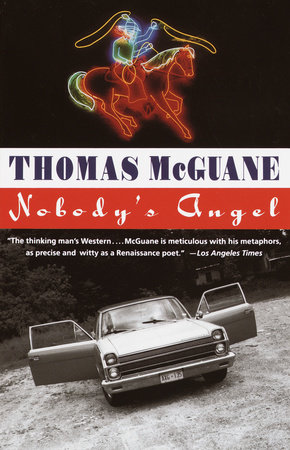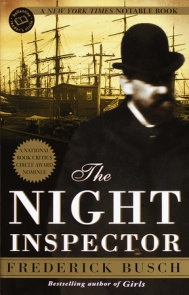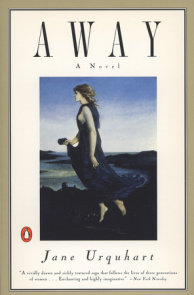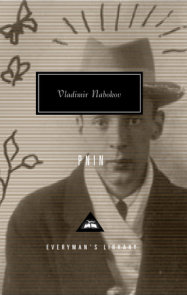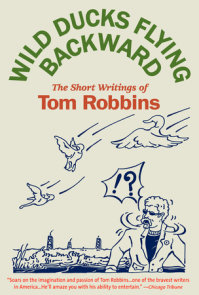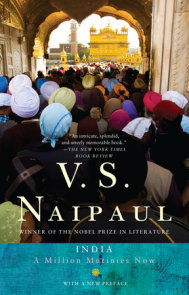READERS GUIDE
Introduction:In Thomas McGuane’s first novel set in his famed American West, Patrick Fitzpatrick is a former soldier, a fourth-generation cowboy, and a whiskey addict. His grandfather wants to run away to act in movies, his sister wants to burn the house down, and his new stallion is bent on killing him: all of them urgently require attention. But increasingly Patrick himself is spiraling out of control, into that region of romantic misadventure and vanishing possibilities that is Thomas McGuane’s Montana. Nowhere has McGuane mapped that territory more precisely—or with such tenderhearted lunacy—than in Nobody’s Angel.A novel about a former soldier in Big Sky Country whose life is spiraling out of control, from the acclaimed author of Ninety-two in the Shade and Cloudbursts, who is “among the most arresting and fascinating [writers] of his generation” (San Francisco Chronicle).
In McGuane’s first novel set in his famed American West, Patrick Fitzpatrick is a former soldier, a fourth-generation cowboy, and a whiskey addict. His grandfather wants to run away to act in movies, his sister wants to burn the house down, and his new stallion is bent on killing him: all of them urgently require attention. But increasingly Patrick himself is spiraling out of control, into that region of romantic misadventure and vanishing possibilities that is Thomas McGuane’s Montana. Nowhere has McGuane mapped that territory more precisely—or with such tenderhearted lunacy—than in Nobody’s Angel, a novel that places him in a genre of his own.
Nostalgic, wryly funny, and cast with rich characters, Nobody’s Angel perfectly captures the alienated spirit of man at odds with himself and a rapidly changing West.
The following questions are designed to enrich your book club’s discussion of Nobody’s Angel.
Questions and Topics for Discussion
1. The novel opens with a pointed epigraph by Malcolm Lowry: “I love hell. I can’t wait to get back.” In what ways does that sentiment align with Patrick’s journey?
2. After meeting Claire, Patrick is determined to be “somebody’s angel.” Does he succeed at all? Who, in his orbit, do you think needs the attendance of an angel most? And ultimately, is there a touch of irony in the title of McGuane’s novel?
3. On page 61, Patrick says he loves his ranch but that it is all “edges and no middle.” What do you think Patrick means by that?
4. Is Claire’s relationship with Patrick in any way redemptive for him? Or does it eventually add to the burden of “coming home”?
5. Patrick is beset by “sadness for no reason.” Though he has his reasons, he can’t pinpoint the funk to anything specific. Can you relate to that feeling of a sudden, inexplicable melancholy? How can it be resolved if you can’t identify the source?
6. When Patrick is nearly killed by his stallion, his sister, Mary, reasons that the unruly horse, Patrick, and the universe are connected. Is that an irrational observation?
7. Why do you think Patrick’s affinity with nature and horses is greater than his ability to connect with, and appreciate, the people around him?
8. The grandfather’s desire to be in the movies comes not only from desire for marginal fame but a longing to return to the “mythic” West that old movies promised. Can you cite any examples of those movie myths and the ways in which revisionist Westerns challenged them?
9. If this Western has a “villain,” it’s Tio, yet what do you make of his assessment of Patrick? “Nothing will happen to you. You’re not important enough and nobody is going to make you important enough.” (197) Is he just being cruel, or in some ways does he nail it, as far as Patrick is concerned?
10. Patrick’s first, last, and most important woman in his life is Marion Easterly, though she doesn’t even exist. Is this dream girl Patrick’s saving grace, or is she an invention destined to doom him?
11. The embittered grandfather longs for the good old days. But were those days a reality? Or are they, like Marion, a dream of better things that never existed in the first place? Is sentimental nostalgia healthy, necessary, or an impediment to moving on?
12. Can you give any examples of how McGuane’s elliptical writing and plotting parallel Patrick’s belief that there are “no easy answers”? (179)
13. In what ways does Patrick exhibit self-destructive behavior? In turn, what are the destructive elements in his life beyond his control? Or are they one and the same?
14. Patrick can’t seem to shake his feeling of being “superfluous.” Why do you think he feels that way? He, at least, appears to be an integral part in the lives of his grandfather, his sister, and Claire. Is it just another symptom of the Fitzpatrick family melancholy?
15. Tio’s death should have been the catalyst for bringing two lovers like Claire and Patrick closer together. Instead, it precipitates the end of their affair. Why do you think that is?
16. In the end Patrick leaves behind the past and settles in Madrid. Rumors are seeded that he’s a blackout drinker. Are they just rumors or do you envision something different for Patrick? Has he found fulfillment in fantasy?
Suggested Reading
Fiction for Further ReadingThomas McGuane, Ninety-two in the Shade
Pat Conroy, The Prince of Tides
Philip Roth, Letting Go
Téa Obreht, Inland
Cormac McCarthy, Blood Meridian
Richard Erdoes Richard Erdoes Richard Erodes, Legends and Tales of the American West
Nonfiction for Further Reading
Brad Tylor, Opportunity, Montana
Suleika Jaouad, Between Two Kingdoms
Thomas McGuane, Some Horses: Essays









